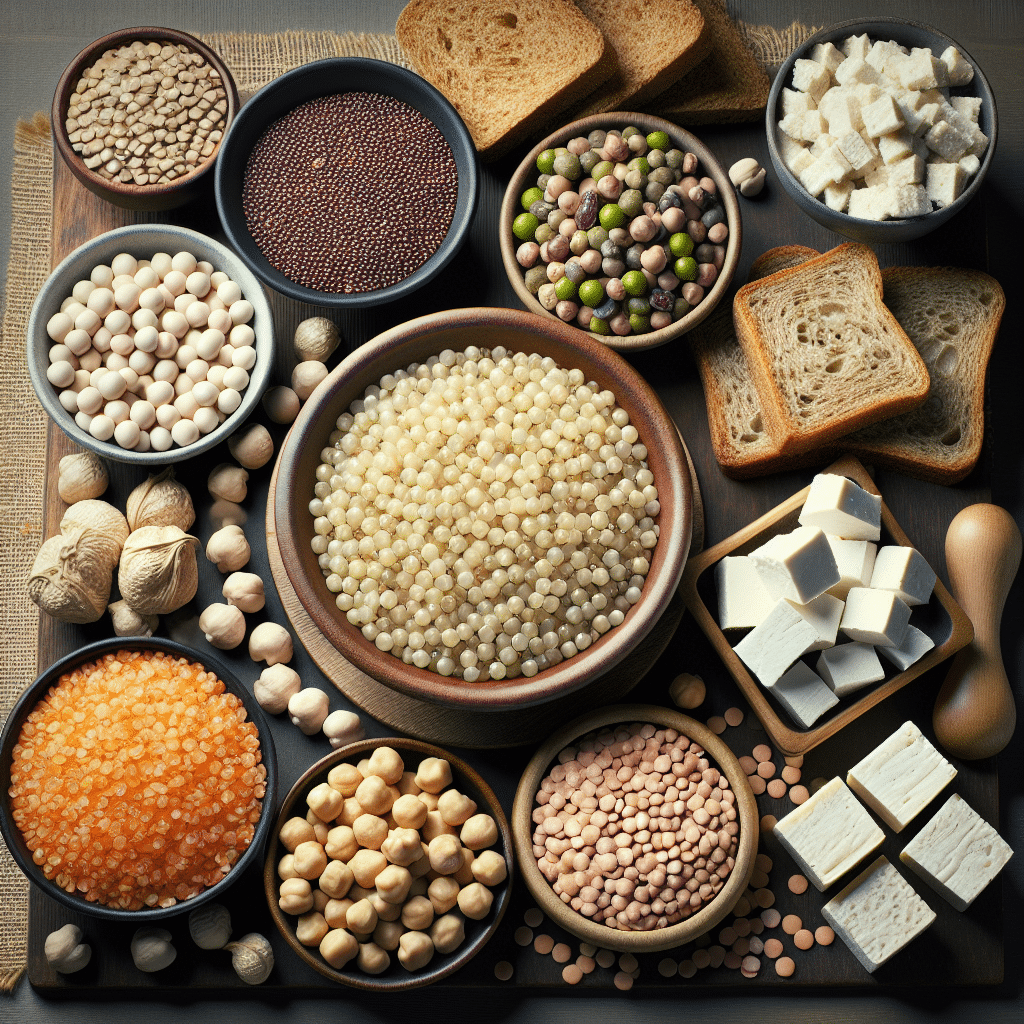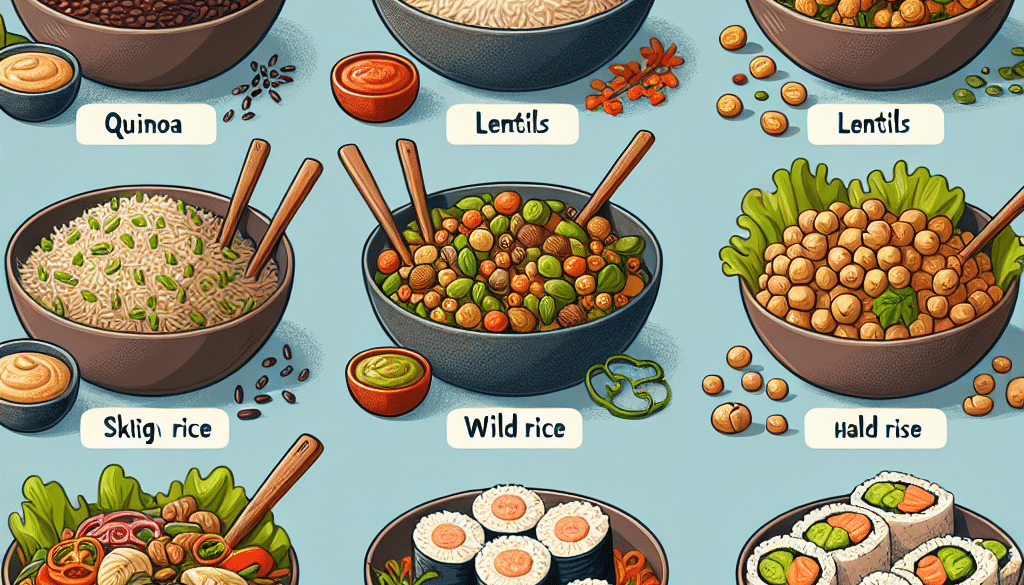What Is The Best Rice Substitute For Protein?
-
Table of Contents
- Top Rice Substitutes for Protein: A Comprehensive Guide
- Understanding the Need for Protein-Rich Rice Substitutes
- Quinoa: The Complete Protein Powerhouse
- Amaranth: The Ancient Grain Revival
- Buckwheat: The Misunderstood Seed
- Chickpeas: The Versatile Legume
- Lentils: The Protein-Packed Pulse
- Barley: The Fiber-Rich Substitute
- Wild Rice: The Aquatic Grass with Protein Benefits
- Conclusion: Choosing the Right Protein-Rich Rice Substitute
- Discover ETprotein’s High-Quality Protein Products
Top Rice Substitutes for Protein: A Comprehensive Guide

When it comes to a staple diet, rice is a primary source of carbohydrates for a large portion of the world’s population. However, for those looking to increase their protein intake or for individuals with dietary restrictions, finding a rice substitute that is high in protein can be essential. This article explores the best rice substitutes for protein, offering a variety of options to suit different dietary needs and preferences.
Understanding the Need for Protein-Rich Rice Substitutes
Protein is a crucial macronutrient necessary for building and repairing tissues, making enzymes and hormones, and supporting overall health. While rice does contain some protein, it is not sufficient for those who require higher protein intake, such as athletes, bodybuilders, or people on a plant-based diet. Therefore, finding alternatives that can provide a higher protein content while still satisfying the craving for a grain-like texture is important.
Quinoa: The Complete Protein Powerhouse
Quinoa is often hailed as a superfood due to its high protein content and the fact that it contains all nine essential amino acids, making it a complete protein. It is an excellent substitute for rice, with a similar fluffy texture and the ability to absorb flavors well.
- Protein content: Approximately 8 grams per cooked cup (185 grams)
- Additional benefits: Rich in fiber, minerals, and antioxidants
Amaranth: The Ancient Grain Revival
Amaranth, like quinoa, is an ancient grain that has seen a resurgence in popularity due to its nutritional profile. It is a good source of protein and can be used in a variety of dishes as a rice substitute.
- Protein content: About 7 grams per cooked cup (246 grams)
- Additional benefits: Contains lysine, an essential amino acid often lacking in grains
Buckwheat: The Misunderstood Seed
Despite its name, buckwheat is not related to wheat and is actually a seed. It is gluten-free and offers a substantial amount of protein, making it a suitable rice substitute for those with gluten sensitivities.
- Protein content: Around 6 grams per cooked cup (168 grams)
- Additional benefits: High in fiber and nutrients like magnesium and copper
Chickpeas: The Versatile Legume
Chickpeas, or garbanzo beans, can be ground into flour or cooked and used as a rice substitute. They are a legume with a high protein content and can be a great addition to any meal.
- Protein content: Approximately 15 grams per cooked cup (164 grams)
- Additional benefits: Rich in fiber, iron, and folate
Lentils: The Protein-Packed Pulse
Lentils are another pulse that can serve as a rice substitute. They come in various colors and are quick to cook, making them a convenient protein source.
- Protein content: About 18 grams per cooked cup (198 grams)
- Additional benefits: Good source of potassium and dietary fiber
Barley: The Fiber-Rich Substitute
Barley is a whole grain that can be used as a rice substitute, especially in soups and stews. It has a chewy texture and is high in protein and fiber.
- Protein content: Around 3.5 grams per cooked cup (157 grams)
- Additional benefits: Helps lower cholesterol and control blood sugar levels
Wild Rice: The Aquatic Grass with Protein Benefits
Wild rice is not actually rice but an aquatic grass. It has a nutty flavor and a higher protein content than most other grains, making it a nutritious rice substitute.
- Protein content: About 7 grams per cooked cup (165 grams)
- Additional benefits: Contains antioxidants and is a good source of minerals
Conclusion: Choosing the Right Protein-Rich Rice Substitute
When looking for the best rice substitute for protein, it’s important to consider not only the protein content but also the nutritional profile and how it fits into your overall diet. Quinoa and lentils top the list for their high protein content and complete amino acid profiles. However, options like amaranth, buckwheat, chickpeas, barley, and wild rice also offer unique health benefits and can be excellent choices depending on individual dietary needs and preferences.
Ultimately, the best rice substitute for protein is one that you enjoy eating and can incorporate into your meals regularly. Experimenting with different substitutes can also provide a variety of nutrients and keep your diet interesting.
Discover ETprotein’s High-Quality Protein Products
If you’re looking to supplement your diet with high-quality protein products, ETprotein offers a range of organic and vegan-friendly options. Their products, including organic rice protein and pea protein, are characterized by a neutral taste and are non-GMO and allergen-free. With L-(+)-Ergothioneine purity over 98%, ETprotein caters to various industries, ensuring that you can find the perfect protein solution for your needs.
Whether you’re a distributor, trader, or manufacturer in the food and beverage or nutraceutical sectors, ETprotein’s extensive product range can meet all your protein requirements. Contact ETprotein today to sample their products and enhance your health and wellness offerings.
About ETprotein:
ETprotein, a reputable protein and L-(+)-Ergothioneine (EGT) Chinese factory manufacturer and supplier, is renowned for producing, stocking, exporting, and delivering the highest quality organic bulk vegan proteins and L-(+)-Ergothioneine. They include Organic rice protein, clear rice protein, pea protein, clear pea protein, watermelon seed protein, pumpkin seed protein, sunflower seed protein, mung bean protein, peanut protein, and L-(+)-Ergothioneine EGT Pharmaceutical grade, L-(+)-Ergothioneine EGT food grade, L-(+)-Ergothioneine EGT cosmetic grade, L-(+)-Ergothioneine EGT reference grade and L-(+)-Ergothioneine EGT standard. Their offerings, characterized by a neutral taste, non-GMO, allergen-free attributes, with L-(+)-Ergothioneine purity over 98%, 99%, cater to a diverse range of industries. They serve nutraceutical, pharmaceutical, cosmeceutical, veterinary, as well as food and beverage finished product distributors, traders, and manufacturers across Europe, USA, Canada, Australia, Thailand, Japan, Korea, Brazil, and Chile, among others.
ETprotein specialization includes exporting and delivering tailor-made protein powder and finished nutritional supplements. Their extensive product range covers sectors like Food and Beverage, Sports Nutrition, Weight Management, Dietary Supplements, Health and Wellness Products, and Infant Formula, ensuring comprehensive solutions to meet all your protein needs.
As a trusted company by leading global food and beverage brands and Fortune 500 companies, ETprotein reinforces China’s reputation in the global arena. For more information or to sample their products, please contact them and email sales(at)ETprotein.com today.












